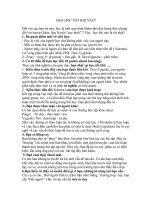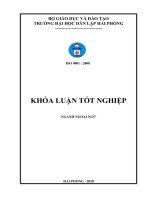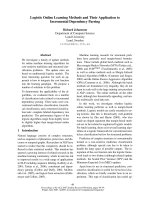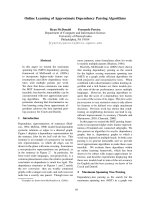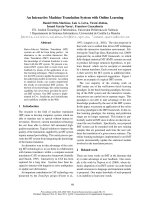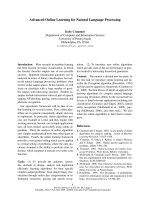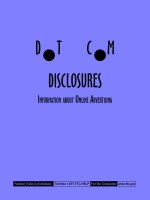Argumentative essay mẫu about online learning
Bạn đang xem bản rút gọn của tài liệu. Xem và tải ngay bản đầy đủ của tài liệu tại đây (46.66 KB, 7 trang )
Good Online Learning Research Paper Example
Abstract:
America has long been known for its competitive edge in many aspects of society,
especially in the quality of education it offers to students. Many students would prefer
American universities as they perceive that once they finish their education, they will
have an edge over their peers. However, in recent years, the quality of American
schools and universities have significantly dropped due to factors like cost, security
and accessibility. Several programs and initiatives were proposed to solve this issue,
one of them was online learning. Since it was introduced, online learning has gained
a huge following from students to educators alike due to its benefits. However, critics
believe that online learning would not be able to produce the same quality as that of
traditional earning. This paper will discuss the nature of online learning and how it
impacts education and teaching in the present time.
Online Learning
The United States of America has long been known to have pioneered the standards
to what society should be like to stabilize development. In the field of education,
America is known for its quality education as it is the home to several of the world’s
Ivy League universities and institutions. Many foreign students fly to the US for the
hope of getting quality education that can help them in their career. According to the
report of the Institute of International Education cited by Strauss (2013), foreign
students hoping for quality education in the US now reached up to 819,644 students
as of the 2012-13 academic calendar. The report stated that this number continues
to increase each year, showing that many students trust America’s education system
and its perceived ‘high-quality .’
However, in recent years, America’s educational system has been declining rapidly.
According to Beard (2013), the country now records a decline of students proficient
in mathematics, problem solving and even literacy despite being known in the past
as a leader of innovation in technology. The country currently ranks 21 out of 23
countries cited by the Organization for Economic Cooperation and Development in
math proficiency while it ranks 17 out of 19 countries in terms of problem solving .
Online learning has been proposed as a possible alternative to entice students back
to school; but it has met opposition from those wishing to retain traditional learning.
Online learning is more efficient than traditional learning due to its mobility and
flexibility, costs and improvements it would give to both teachers and students alike.
Supporters to online learning often stress that this medium is very mobile and flexible
for both learners and teachers alike as compared to traditional learning. According to
Anderson (2008), online learning can be done no matter what time or place students
or teachers may be at any given time. Students can opt to do their classes at any
given pace while others can opt to use discussion forums and online meet-ups to
discuss with their peers. These open access to resources also allows students and
experts interact and discuss the concepts much like in a normal classroom.
Educators can also use the online learning platform to do tutoring and monitor the
progress or needs of the students .
In the study done by Alexander, Truell and Zhao (2012) many students in higher
education have taken online courses due to economic situations and the lower cost it
entails. With online courses, students do not have to pay travel and dress cost, as
well as pay for fees such as parking and food . Ranasignhe and Leisher (2009)
indicated that teachers would become more up-to-date as the access to the internet
could open up-to-date databases regarding their specialties . For students, Good
(2008) argued that online courses are beneficial especially for those who wish to
take advance study especially if it is not offered in the current syllabus .
However, there are also disadvantages to online learning which affects students and
teachers alike. Rosenblatt (2013) stated that some students and most teachers
cannot have the same face-to-face component that allows further collaboration. The
lack of face-to-face component also disables educators to determine the capacity of
students in comparison to traditional classrooms. Further complicating the
collaboration benefit of online learning is the technological complications this
learning platform would require. There is a possibility that these platforms would
bring poor processing performance or sometimes, cause technical difficulties for
users .
However, the educators and some students are weary of the possibility of academic
dishonesty. Luppicini (2007) stated that virtual learning environments often trigger
poor learning habits as students could easily cheat on online learning platforms.
Some students can obtain unauthorized files or copy other work to pass off as their
own work. Teachers often have to read each work to ensure that it is correct and
authentic. Cheating can also be done through the internet, especially in assessments
.
Applying online learning in education, especially in the classroom, presents several
enhancements that would improve the learning experience. Ranasinghe and Leisher
(2009) argued that the application of new innovations would allow teachers and
students to have a more interactive experience while in the classroom. The
instructiveness and interactivity brought by computers or online networks would
permit students to understand real-world problems for analysis. Online learning also
give new mediums to understand otherwise complicated theories and concepts .
Online learning also enhances the learning experience as it continuous to change
regularly in format. Mackness, Mak and Williams (2010) stated that new learning
classroom environments such as Massive Open Online Courses (MOOC) are now
becoming popular for many universities around the globe. These MOOCs allow
interactive environments for both students and instructors to use, whilst following the
same class and grading scheme like traditional methods. Instructors are allowed to
use various technologies to introduce the topic and grade students while students
are given autonomy as to how they will finish the course requirements .
Several studies have been done throughout the country to determine the position of
educators and students on online learning. Kim and Bonk (2006) stated that many
instructors – mostly women – have been using online learning as a means to teach
online. When asked through the study, users of online learning indicated that they
prefer online education given the various tools that can be used to keep up with
students. Respondents on the survey cited that online learning would not be possible
without technology. However, it is important that online learning must be revised
consistently to keep up with the enormous learner demands for new programs and
instructor capacity .
Allen & Seaman (2011) stated that Americans – from students to institutions – are
now applying online education in their education scheme. In the study, 65% of all
institutions are now using online learning to sustain the demand of learners. At least
6.1 million students are now taking one online course as of 2010 and this number
increases in each educational level. With regards to the quality of online learning, at
least 57% of academic experts are now saying that online learning is similar to faceto-face learning. They also believe that these online offering would help in
introducing new concepts to students and get them to keep studying .
In another study, Swan (2003) argued that there is not much difference between
online learning and traditional learning. What did vary is the form of interaction,
consistency and assessment forms used by both learning platforms. The study
indicated that if educators are going to apply online learning in their scheme, there
should be training done to ensure that support can be provided to learners. Courses
must also be up-to-date and feedback should not be limited to ensure that students
can be tested with their proficiency .
Finally, Jaggars (2011) also supported Swan’s study and indicated that online
completion and progression can still be improved. First and foremost, online
assessments can be used to determine what type of lesson plan can be given to
students. Colleges can use online learning to serve as a prerequisite for specific
courses to improve computer literacy and other skills. Each online course should
also be retrofitted and designed to accommodate the needs of the students,
especially those who are struggling to keep up with the study .
Even if there is apprehension in the side of educators, it would be difficult to ignore
the benefits and advantages posed by using online learning environments. For this
writer, online learning is very beneficial and efficient especially now that traditional
learning is very costly. Many aspiring students have also been unable to achieve
their dreams due to the accessibility of education in their communities, while
teachers would need alternative classes to bring students’ interest back through
interactive learning. However, this writer also concedes that online learning does
have its setbacks that should be taken care of before it is considered. As online
learning would allow students to use the internet to help in their work, there might be
overreliance and poor learning habits to develop for both teachers and students.
Excluding this writer’s opinion, educators should maintain an open mind when it
comes to the use of newer innovations such as the use of online learning mediums.
It would be difficult to exclude technological advancement from education, especially
now that technology is an integral part of life today. Admittedly, online learning is still
far from perfect but if educators work hand in hand with its developers, there is a
possibility online learning can become at par with traditional learning. With the
increasing fees of traditional learning and factors hindering students in using
traditional means, it is important that alternatives are ready to accommodate them.
Online learning may possibly reignite the spark of students’ desire to learn and give
teachers the inspiration to incorporate the 21st century to their specializations.
References
Alexander, M., Truell, A., & Zhao, J. (2012). Expected Advantages and
Disadvantages of Online Learning: Perceptions from College Students Who Have
not Taken Online Courses. Issues in Information Systems, 13(2), 193-200.
Allen, I. E., & Seaman, J. (2011). Going the Distance: Online Education in the United
States, 2011. New York: Babson Survey Research Group.
Anderson, T. (2008). The Theory and Practice of Online Learning. Edmonton:
Athabasca University Press.
Beard, K. (2013, November 13). Behind America's Decline in Math, Science and
Technology.
Retrieved
from
US
News:
/>
Good, T. (2008). 21st Century Education: A Reference Handbook. New York: SAGE
Publications.
Jaggars, S. S. (2011). Online Learning: Does it help low-income and underprepared
students? New York: Community College Research Center.
Kim, K.-J., & Bonk, C. (2006). The Future of Online Teaching and Learning in Higher
Education: The Survey Says Educause Quarterly(4), 22-30.
Luppicini, R. (2007). Online Learning Communities. Charlotte: Information Age
Publishing.
Mackness, J., Mak, S. F., & Williams, R. (2010). The Ideals and Reality of
Participating in a MOOC. Proceedings of the 7th International Conference on
Networked Learning (pp. 266-274). Bailrigg: University of Portsmouth.
Ranasinghe, A., & Leisher, D. (2009). The Benefit of Integrating Technology into the
Classroom. International Mathematical Forum, 4(40), 1955-1961.
Rosenblatt, H. (2013). Systems Analysis and Design. Boston: Cengage Learning.
Strauss, V. (2013, November 11). Record number of foreigners study in the U.S.
while more American students go overseas. Retrieved from The Washington Post:
/>Swan, K. (2003). Learning Effectiveness Online: What the Research Tells Us? In J.
Bourne, & J. C. Moore, Elements of Quality Online Education, Practice and Direction
(pp. 13-45). Needham: Sloan Center for Online Education.
THÔNG TIN HỎI ĐÁP:
-------------------------Trong quá trình làm bài Essay, bạn muốn tìm kiếm thêm nhiều tài liệu bài mẫu, cách
làm bài Essay cập nhật mới của Trung tâm Best4Team
Liên hệ dịch vụ thuê viết essay tiếng anh
Hoặc qua SĐT Zalo: 091.552.1220 hoặc email: để hỗ
trợ ngay nhé!
